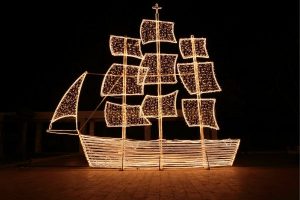The Enchantment of Old Christmas Traditions in Greece
In Greece, Christmas is a festive celebration and a profound blend of rich traditions, ancient customs, and deep-rooted religious beliefs. Greek Christmas traditions are a colorful tapestry of history and culture, offering a unique perspective on the holiday season. From the mystical to the sacred, these traditions have been passed down through generations, enriching the Greek Christmas experience.
Karavaki: Sailing into Christmas
One of the most enchanting Greek Christmas traditions is the decoration of the Karavaki, a small wooden boat. This symbolizes Greece’s deep connection with the sea. Instead of the more widely recognized Christmas tree, many Greek homes and villages display these beautifully adorned boats, paying homage to the maritime heritage and the sailors returning home for the holidays. Illuminated with lights and ornaments, the Karavaki sets a distinctive and charming tone for the Christmas celebrations.
The Festive Kalanta
The singing of Kalanta, the Greek version of caroling, marks the start of the holiday season. Children go from door to door on Christmas Eve, New Year’s Eve, and the Eve of Epiphany, singing these traditional carols accompanied by triangles or guitars. These songs are often blessings and narrate stories related to the holidays. In return, children are rewarded with sweets, dried fruits, and small amounts of money, which spreads joy and goodwill.
The Christmas Fast and Feast
Fasting before Christmas is a significant tradition in Greece, with many abstaining from meat and dairy products for 40 days leading up to Christmas. This period of fasting, known as Saranta Meres (Forty Days), is a time for spiritual reflection and preparation for the birth of Christ. The fast ends on Christmas Day with a sumptuous feast, where families gather to enjoy a variety of traditional dishes. The star of the Christmas table is often Christopsomo, a special bread adorned with a cross, which is broken and shared among the family.
The Protective Spirits: Kallikantzaroi
Greek folklore brings to life the Kallikantzaroi, mischievous goblins believed to surface during the 12 days of Christmas, from Christmas to Epiphany. These creatures are said to cause havoc and are kept at bay with various rituals and customs, such as keeping the fireplace lit throughout the night and marking the door with a cross on Christmas Eve.
The Vasilopita: A New Year’s Tradition
The cutting of the Vasilopita, a New Year’s cake, is a cherished tradition. A coin is hidden in the cake, and the family gathers to cut it at midnight on New Year’s Eve. The person who finds the coin is believed to have good luck for the coming year. This tradition honors Saint Basil, known in Greek as Agios Vasilis, the Greek version of Santa Claus and brings gifts to children on New Year’s Day.
The Blessing of the Waters: Theophania
The holiday season in Greece concludes with Theophania, or Epiphany, on January 6th. This day commemorates the baptism of Christ, and it is celebrated with the Blessing of the Waters. Priests throw a cross into the sea, river, or lake, and young men dive to retrieve it, a ritual believed to bring blessings and good luck.
A Timeless Celebration
Old Christmas traditions in Greece are not just practices but are the heart and soul of the holiday season. They encapsulate the essence of Greek culture, history, and spirituality, offering a rich and immersive experience. These traditions are a vivid reminder of the country’s enduring heritage and the timeless nature of its celebrations. As the world evolves, these age-old customs stand as a testament to the enduring spirit of Greek Christmas, inviting us all to partake in its mystical and joyous festivities.
